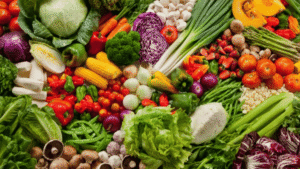Agricultural marketing and e-commerce are two critical components of the modern food supply chain, and they play a vital role in determining the success and sustainability of agricultural businesses.
With the rise of technology and the increasing importance of e-commerce in the global marketplace, it is essential for agricultural businesses to understand the role of agricultural marketing and e-commerce in today’s economy and to develop strategies that leverage these tools to their advantage.
The importance of agricultural marketing
Agricultural marketing is the process of promoting and selling agricultural products, and it is a crucial aspect of the success of any agricultural business. Agricultural marketing can take many forms, including advertising, public relations, sales promotions, personal selling, and direct marketing.

Agricultural marketers must understand the needs and wants of their target audience, as well as the strengths and weaknesses of their products, in order to develop effective marketing strategies.
Agricultural marketing also plays a critical role in connecting farmers and producers with consumers, helping to build trust and establish long-lasting relationships between the two groups.
By engaging with consumers and building relationships, agricultural marketers can help to educate the public about the importance of agriculture, and they can encourage support for the agricultural industry.
The role of e-commerce in agricultural marketing
E-commerce has revolutionized the way that businesses operate, and it has played a critical role in the growth of the agricultural industry. E-commerce provides agricultural businesses with access to a global market, allowing them to reach new customers and expand their reach beyond traditional geographic boundaries.
E-commerce also provides consumers with access to a wider range of products and allows them to purchase products from the comfort of their own homes. E-commerce has also made it easier for agricultural businesses to connect with customers and build relationships, as well as provide new opportunities for marketing and promotion.
Agricultural businesses can use e-commerce platforms to promote their products and reach a wider audience, and they can also use e-commerce to sell their products directly to consumers.
The challenges of agricultural marketing and e-commerce
Despite the many benefits of agricultural marketing and e-commerce, there are also challenges that must be addressed in order to ensure the success of these strategies.
One of the biggest challenges is the lack of access to technology and electronic commerce platforms in rural areas, which can make it difficult for farmers and producers to connect with customers and reach new markets.
Another challenge is the need for agricultural businesses to develop strong, secure, and reliable online platforms to sell their products, and to provide accurate and up-to-date information to consumers.
In addition, there are regulatory challenges, such as the need to comply with food safety regulations and labeling requirements, that must be addressed in order to ensure the success of agricultural marketing and e-commerce.
The future of agricultural marketing and e-commerce
The future of agricultural marketing and e-commerce is likely to be shaped by continued advancements in technology and increased consumer demand for transparency, sustainability, and convenience.
Agricultural businesses must be proactive in adapting to these changes, and they must be prepared to leverage the power of e-commerce and technology to reach new customers and grow their businesses.
In conclusion, agricultural marketing and e-commerce are critical components of the modern food supply chain, and they play a vital role in the success and sustainability of agricultural businesses.
By understanding the challenges and opportunities presented by these strategies, agricultural businesses can develop effective marketing and e-commerce strategies that help them succeed in today’s economy and beyond.
Innovations in agricultural marketing and e-commerce
In recent years, there have been many exciting innovations in the field of agricultural marketing and electronic commerce, and these developments have the potential to greatly improve the efficiency and effectiveness of these strategies.
One of the most promising innovations is the use of blockchain technology, which has the potential to increase transparency, traceability, and security in the food supply chain. This could help agricultural businesses to build trust with consumers and ensure the quality and safety of their products.
Another innovation is the use of artificial intelligence and machine learning, which can help to automate and streamline many of the processes involved in agricultural marketing and e-commerce. For example, AI-powered chatbots can be used to answer customer inquiries and provide support, while machine learning algorithms can be used to analyze customer data and inform marketing decisions.
Finally, the increasing popularity of online marketplaces, such as Amazon and Alibaba, presents new opportunities for agricultural businesses to reach new customers and expand their reach. By leveraging these platforms, agricultural businesses can reach a wider audience, increase their sales, and improve their marketing and e-commerce strategies.
Best practices for agricultural marketing and e-commerce

There are several best practices that agricultural businesses can follow in order to develop effective marketing and electronic commerce strategies. One of the most important is to have a clear understanding of your target audience and to tailor your marketing and e-commerce strategies to meet the needs and preferences of your customers.
Another best practice is to invest in technology and digital tools that can help you to reach new customers and build relationships with existing ones. This may include developing a strong online presence, creating engaging and informative websites, and utilizing social media and email marketing to reach your target audience.
It is also important to prioritize customer service and to respond quickly and effectively to customer inquiries and concerns. Finally, it is essential to comply with food safety regulations and labeling requirements and to work closely with regulatory bodies to ensure the safety and quality of your products.
Conclusion:
Agricultural marketing and electronic commerce are critical components of the modern food supply chain, and they play a vital role in the success and sustainability of agricultural businesses.
By understanding the challenges and opportunities presented by these strategies, and by leveraging new innovations and best practices, agricultural businesses can develop effective marketing and e-commerce strategies that help them succeed in today’s economy and beyond.










